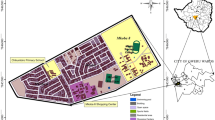Abstract
Proper solid waste management has become a critical environmental issue for Metropolitan, Municipal and District Assemblies in Ghana. Despite the efforts of authorities to remediate the issue, it remains a great hurdle to overcome. This study assesses the readiness of the Ga West municipality to integrate waste segregation into solid waste management in its markets. Interviews conducted with key stakeholders and questionnaires administered to traders were analysed using a binomial logistic model. Findings from the interviews reveal that the municipality, in the period of this study, not only had no bylaws for waste segregation, but was also inadequately resourced. In addition, we found that 60% of the traders were willing to segregate waste, though only 23.4% were willing to pay for its collection. Income, work experience, and marital status were found to influence willingness to separate waste at source (P < 0.05). Age (20–30 years) and awareness were found to also have a significant influence on a trader’s willingness to pay for the collection of waste (P < 0.05). It is recommended that, for waste segregation to be implemented in markets, municipal authorities ought to formulate bylaws that promote waste segregation from source. Additionally, they must provide the required infrastructure, such as different waste skips for different types of waste; embark on massive education; and introduce innovative strategies such as paying less for the disposal of segregated waste. These measures can help to increase the willingness of market traders to pay for waste disposal.





Similar content being viewed by others
References
Kaza S, Yao LC, Bhada-Tata P, Van Woerden F (2018) What a waste 2.0: a global snapshot of solid waste management to 2050. Urban development. World Bank, Washington, DC. https://openknowledge.worldbank.org/handle/10986/30317License:CCBY3.0IGO. Accessed 18 Dec 2018
Rodic L, Wilson DC (2017) Resolving governance issues to achieve priority SDGs related to solid waste management. Sustainability 9:404. https://doi.org/10.3390/su9030404
Marshall RE, Farahbakhsh K (2013) Systems approaches to integrated solid waste management in developing countries. Waste Manag 33(4):988–1003
Un-Habitat (2016) Planning sustainable cities: global report on human settlements 2009. Routledge, Abingdon
Miezah K, Obiri-Danso K, Kádár Z, Fei-Baffoe B, Mensah MY (2015) Municipal solid waste characterization and quantification as a measure towards effective waste management in Ghana. Waste Manag 46:15–27
Oteng-Ababio M, Arguello JEM, Gabbay O (2013) Solid waste management in African cities: sorting the facts from the fads in Accra, Ghana. Habitat Int 39:96–104
Ministry of Local Government and Rural Development (MLGRD) (2010) Environmental sanitation policy (Revised September 2010). MLGRD, Accra
Oteng-Ababio M (2010) Private sector involvement in solid waste management in the Greater Accra Metropolitan Area in Ghana. Waste Manag Res 28(4):322–329
Oteng-Ababio M (2012) The role of the informal sector in solid waste management in the GAMA, Ghana: challenges and opportunities. Voor Economische en Sociale Geografie 103(4):412–425
UNICEF and WHO (2015) Progress on sanitation and drinking water. WHO, Geneva. http://files.unicef.org/publications/files/Progress_on_Sanitation_and_Drinking_Water_2015_Update_.pdf. Accessed 12 July 2018
Andersson K, Dickin S, Rosemarin A (2016) Towards “sustainable” sanitation: challenges and opportunities in urban areas. Sustainability 8(12):1289
Union I (2014) Communication from the Commission to the European Parliament, the Council, the European Economic and Social Committee and the Committee of the Regions. Brussels
Wilson et al (2015) Global waste managment outlook. United Nations Environmental Programme, Nairobi
Singh J, Laurenti R, Sinha R, Frostell B (2014) Progress and challenges to the global waste management system. Waste Manag Res 32(9):800–812
Afifi S, Alnahhal S, Abdelall S (2015) Developing an integrated sustainable sanitation system in urban areas: Gaza Strip case study. Procedia CIRP 26:767–774
Yukalang N, Clarke B, Ross K (2018) Solid waste management solutions for a rapidly urbanizing area in Thailand: recommendations based on stakeholder input. Int J Environ Res Public Health 15(7):1302
Eurostat (2018) Municipal waste landfilled, incinerated, recycled and composted in the EU-28, 1995 to 2016. https://ec.europa.eu/eurostat/statistics-explained/index.php?title=File:Municipal_waste_landfilled,_incinerated,_recycled_and_composted_in_the_EU-28,_1995_to_2016. Accessed 16 Jan 2019
Ghana Statistical Service (2012) Ghana population and housing census 2010. Ghana Statistical Service, Accra
Owusu-Sekyere E, Bagah DA, Quansah JYD (2015) The urban solid waste management conundrum in Ghana: will it ever end? World Environ 5(2):52–62
Rahji MAY, Oloruntoba EO (2009) Determinants of households’ willingness-to-pay for private solid waste management services in Ibadan, Nigeria. Waste Manag Res 27(10):961–965
Vassanadumrongdee S, Kittipongvises S (2018) Factors influencing source separation intention and willingness to pay for improving waste management in Bangkok, Thailand. Sustain Environ Res 28(2):90–99
Welfens MJ, Nordmann J, Seibt A (2016) Drivers and barriers to return and recycling of mobile phones. Case studies of communication and collection campaigns. J Clean Prod 132:108–121
Ghani WAWAK, Rusli IF, Biak DRA, Idris A (2013) An application of the theory of planned behaviour to study the influencing factors of participation in source separation of food waste. Waste Manag 33(5):1276–1281
Challcharoenwattana A, Pharino C (2016) Wishing to finance a recycling program? Willingness-to-pay study for enhancing municipal solid waste recycling in urban settlements in Thailand. Habitat Int 51:23–30
Acknowledgements
Authors express sincere gratitude to the Utilization of organic waste for improvement in agricultural productivity (UOWIAP) project for funding this study. Also acknowledged are Ms. Cecilia Datsa who provided support during data gathering and Mr. Gideon Tetteh and Mr. Prosper Apedo who helped with the statistics. UOWIAP was funded by the Food and Business Applied Research Fund through the Netherlands Organization for Scientific Research (NWO).
Author information
Authors and Affiliations
Corresponding author
Additional information
Publisher’s Note
Springer Nature remains neutral with regard to jurisdictional claims in published maps and institutional affiliations.
Rights and permissions
About this article
Cite this article
Agbefe, L.E., Lawson, E.T. & Yirenya-Tawiah, D. Awareness on waste segregation at source and willingness to pay for collection service in selected markets in Ga West Municipality, Accra, Ghana. J Mater Cycles Waste Manag 21, 905–914 (2019). https://doi.org/10.1007/s10163-019-00849-x
Received:
Accepted:
Published:
Issue Date:
DOI: https://doi.org/10.1007/s10163-019-00849-x




